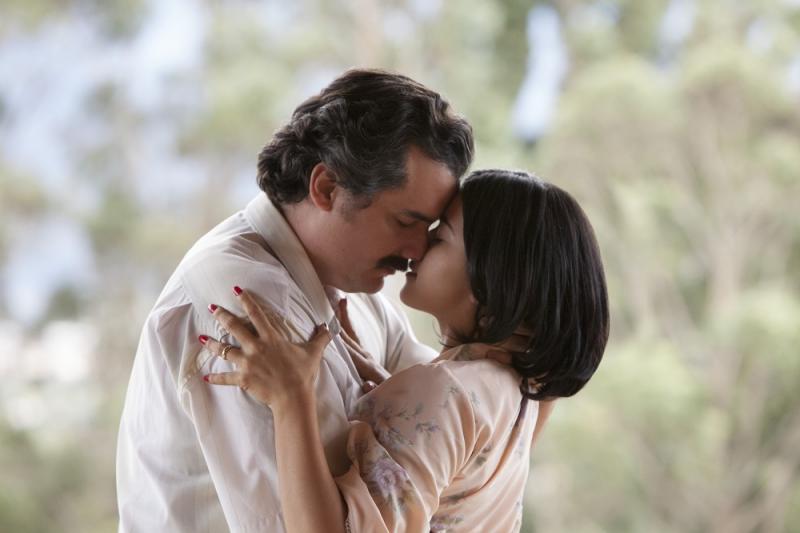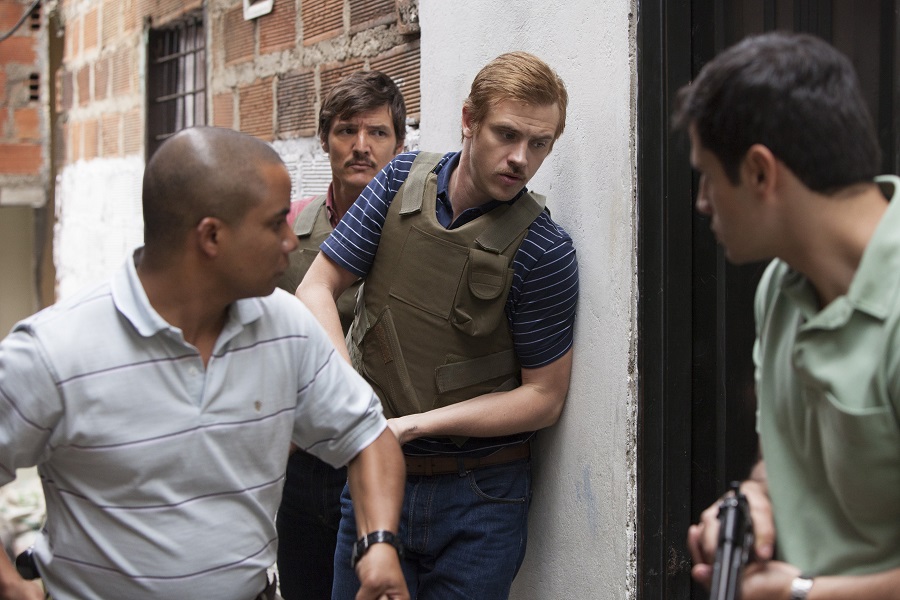Narcos, Season 2, Netflix | reviews, news & interviews
Narcos, Season 2, Netflix
Narcos, Season 2, Netflix
Thrilling conclusion to the teeming saga of billionaire druglord Pablo Escobar

Narcos is back for another white-knuckle trawl through Medellín, the murder capital of the planet in the early 1990s. By the end of last year’s first series the Colombian cocaine lord Pablo Escobar, the seventh richest man in the world, had negotiated a deal with the government in Bogotá which allowed him to take up residence in La Catedral, a hillside redoubt of his own choosing.
The skeletal facts can be located online easily enough, but some may prefer to find out by bingeing on a semi-fictionalised Netflix drama. It suffices to advise it'll be a struggle for him to make it to the third or fourth series, both of which have been announced. At the start of season two, all 10 episodes of which are now available, Escobar breaks out of his gilded cage, soldiers fearful of his monstrous reputation for indestructibility parting like the Red Sea to let him pass. In the words of Steve Murphy (Boyd Holbrook), the DEA foot soldier who supplies the voiceover, his escape constitutes “the biggest law enforcement blunder of all time”. It prompts an epic manhunt by both the Colombian government now headed by Gaviria and a DEA eager to stem the flow of cocaine in the USA (at one point Escobar’s Medellín cartel supplied 80 percent of American needs, and was trousering $60 million a day).
The only problem, as ever with dramas about gangsters, is you too might find yourself rooting for Pablo
It’s quite a conjuring trick that the writers (Chris Brancato, Eric Newman and Carlo Bernard) have pulled off. The action flits between the two cities, the highest echelons of power and the lowliest brothel. In a vast cat’s cradle of characters, almost everyone is on someone else’s kill list – even Escobar’s wife and mother, who think the world of Pablo but, increasingly, rather less of each other as they run to keep ahead of an uneasy alliance of the Colombian miliitary and American law enforcement. Meanwhile, Escobar orders the elimination of rival cartels, which means that he has an extra enemy bent on vengeance in the form of hellcat widow Judy Moncada. “I want everyone in that family dead,” she howls beneath a portrait of herself in an armchair with a large pet tiger by her side. (Nice touch from production design.)
The canvas all but explodes at the seams. To help maintain focus, documentary footage and news clips are inserted featuring the real Escobar, Gaviria, George Bush and other participants in a great pan-American drug saga. There’s even a cameo for Andres Escobar (no relation), the footballer later executed by a gambling syndicate after he scored an own goal in the 1994 World Cup. Perhaps for legal reasons, the names of some criminal associates have been changed (Escobar's son, who is a mere sprog in this but grew up to become an architect in Buenos Aires, dropped the surname like a stone).
 The storyline is sort of held together by the framing device of Murphy’s narrative, but while it does a job it's still a bit of a folksy irritant. “We thought of ourselves as the guys who could get shit done,” he advises at the start. Happily, the drama of his wife’s departure for the safety of Florida is barely allowed elbow room. His more important relationship is with sidekick Javier Peña (Pedro Pascal) and their new female superior (pictured above, Pascal and Holbrook).
The storyline is sort of held together by the framing device of Murphy’s narrative, but while it does a job it's still a bit of a folksy irritant. “We thought of ourselves as the guys who could get shit done,” he advises at the start. Happily, the drama of his wife’s departure for the safety of Florida is barely allowed elbow room. His more important relationship is with sidekick Javier Peña (Pedro Pascal) and their new female superior (pictured above, Pascal and Holbrook).
At the heart of everything is Escobar himself, who would have been flattered to be played by podgy Omar Sharif lookalike Wagner Moura, a Brazilian who had to learn Spanish for the part. In the role of a psychopathic mass murderer who styles himself a champion of the poor by handing out a few banknotes, Moura has lashings of necessary charisma. The people certainly love him. Offered more than $1million to provide information leading to his arrest, they clam up. “It was like asking Chicago to rat out Michael Jordan,” says Murphy.
The only problem, as ever with dramas about gangsters, is you too might find yourself rooting for him. The script – brilliantly paced by director José Padilha – is careful to keep reminding you of this uxorious Robin Hood’s repellent side. Episode two is topped and tailed with images of bloodbaths ordered by Escobar – the execution of half a dozen prostitutes, then a pogrom of his uniformed hunters – while he croons in the shower and dances with his lovely wife Tata. Make no mistake, you can’t wait for his comeuppance. But the journey towards it, through a teeming inferno of moral compromise and international realpolitik, is fiercely gripping.
The future of Arts Journalism
You can stop theartsdesk.com closing!
We urgently need financing to survive. Our fundraising drive has thus far raised £49,000 but we need to reach £100,000 or we will be forced to close. Please contribute here: https://gofund.me/c3f6033d
And if you can forward this information to anyone who might assist, we’d be grateful.

Subscribe to theartsdesk.com
Thank you for continuing to read our work on theartsdesk.com. For unlimited access to every article in its entirety, including our archive of more than 15,000 pieces, we're asking for £5 per month or £40 per year. We feel it's a very good deal, and hope you do too.
To take a subscription now simply click here.
And if you're looking for that extra gift for a friend or family member, why not treat them to a theartsdesk.com gift subscription?
more TV
 Slow Horses, Series 5, Apple TV+ review - terror, trauma and impeccable comic timing
Jackson Lamb's band of MI5 misfits continues to fascinate and amuse
Slow Horses, Series 5, Apple TV+ review - terror, trauma and impeccable comic timing
Jackson Lamb's band of MI5 misfits continues to fascinate and amuse
 Coldwater, ITV1 review - horror and black comedy in the Highlands
Superb cast lights up David Ireland's cunning thriller
Coldwater, ITV1 review - horror and black comedy in the Highlands
Superb cast lights up David Ireland's cunning thriller
 Blu-ray: The Sweeney - Series One
Influential and entertaining 1970s police drama, handsomely restored
Blu-ray: The Sweeney - Series One
Influential and entertaining 1970s police drama, handsomely restored
 I Fought the Law, ITVX review - how an 800-year-old law was challenged and changed
Sheridan Smith's raw performance dominates ITV's new docudrama about injustice
I Fought the Law, ITVX review - how an 800-year-old law was challenged and changed
Sheridan Smith's raw performance dominates ITV's new docudrama about injustice
 The Paper, Sky Max review - a spinoff of the US Office worth waiting 20 years for
Perfectly judged recycling of the original's key elements, with a star turn at its heart
The Paper, Sky Max review - a spinoff of the US Office worth waiting 20 years for
Perfectly judged recycling of the original's key elements, with a star turn at its heart
 The Guest, BBC One review - be careful what you wish for
A terrific Eve Myles stars in addictive Welsh mystery
The Guest, BBC One review - be careful what you wish for
A terrific Eve Myles stars in addictive Welsh mystery
 theartsdesk Q&A: Suranne Jones on 'Hostage', power pants and politics
The star and producer talks about taking on the role of Prime Minister, wearing high heels and living in the public eye
theartsdesk Q&A: Suranne Jones on 'Hostage', power pants and politics
The star and producer talks about taking on the role of Prime Minister, wearing high heels and living in the public eye
 King & Conqueror, BBC One review - not many kicks in 1066
Turgid medieval drama leaves viewers in the dark
King & Conqueror, BBC One review - not many kicks in 1066
Turgid medieval drama leaves viewers in the dark
 Hostage, Netflix review - entente not-too-cordiale
Suranne Jones and Julie Delpy cross swords in confused political drama
Hostage, Netflix review - entente not-too-cordiale
Suranne Jones and Julie Delpy cross swords in confused political drama
 In Flight, Channel 4 review - drugs, thugs and Bulgarian gangsters
Katherine Kelly's flight attendant is battling a sea of troubles
In Flight, Channel 4 review - drugs, thugs and Bulgarian gangsters
Katherine Kelly's flight attendant is battling a sea of troubles
 Alien: Earth, Disney+ review - was this interstellar journey really necessary?
Noah Hawley's lavish sci-fi series brings Ridley Scott's monster back home
Alien: Earth, Disney+ review - was this interstellar journey really necessary?
Noah Hawley's lavish sci-fi series brings Ridley Scott's monster back home
 The Count of Monte Cristo, U&Drama review - silly telly for the silly season
Umpteenth incarnation of the Alexandre Dumas novel is no better than it should be
The Count of Monte Cristo, U&Drama review - silly telly for the silly season
Umpteenth incarnation of the Alexandre Dumas novel is no better than it should be

Add comment